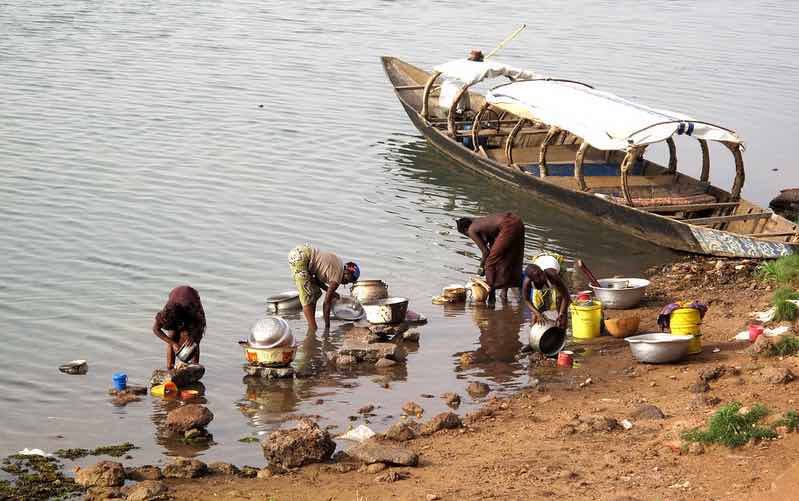Translation option:
World Water Day 2023 (March 22) has the theme “Accelerating Change” through partnerships and cooperation—and coincides with a midterm review of the United Nations International Decade for Action on Water for Sustainable Development 2018-2028, which aims to 1) increase the global focus on more sustainable development; 2) accelerate funding and implementation of water-related Sustainable Development Goals (SDGs); and with this 3) mobilize action toward achieving Agenda 2030.
Few places on Earth need accelerated change and progress toward SDG 6 on water and sanitation as much as West Africa’s Niger River Basin, which supports more than 160 million people and covers 2.23 million square kilometers. The nine countries sharing the basin suffer from extreme water, energy, and food insecurity, as well as immense environmental degradation, growing adverse climate change impacts, and overall instability, insecurity, conflict, and civil strife.
The Niger Basin Authority (NBA) is responsible for coordinating and prioritizing multiple development projects among those nine countries. The Authority’s Operational Plan boasts 350 projects that cover a wide range of investments, including dams, irrigation schemes, navigation, and ecosystem preservation, in addition to management and capacity building activities. Many of these projects are supported by international finance institutions such as the African Development Bank and the World Bank.
However, to be able to coordinate and prioritize across the many development projects and to achieve the Niger Basin’s Shared Vision, the NBA needed a systematic nexus methodology that would ensure that upstream dams support downstream irrigation and fisheries projects and that irrigation projects did not affect wetlands, for example. Without careful assessment of these diverse projects and their interlinkages, the scarce and fragile water, land, and ecosystem resources could suffer unforeseen but potentially irreversible damage, adversely affecting water and related SDGs.
In 2022, efforts accelerated on this front. The European Union and Government of Germany, through GIZ’s Nexus Regional Dialogue Programme in the Niger Basin, supported the NBA and the collaborative work of the University of Ottawa, IFPRI under the NEXUS Gains Initiative, and other partners. They explored ways to build capacity on the Water-Energy-Food-Environment Nexus in the nine basin countries and developed and discussed a Nexus Guidance Document for adoption by the Ministerial Council of the NBA. The Guidance builds on the strong commitment of the NBA and the basin countries it supports to develop synergies from water and other investments for the prosperity of the basin’s population.
A draft of the Nexus Guidance was advanced and discussed during three-day workshops that took place in all nine basin countries. These workshops drew on previous meetings and also included further capacity building on Nexus analysis methodologies developed in an earlier partnership (2018-19), as well as the presentation of a nexus analysis of a nationally selected priority water infrastructure project in each of the countries. Based on the feedback received, a second draft of the guidance was developed and presented at a regional validation workshop on September 2 in Cotonou.
The Nexus Guidelines were then finalized and presented to the Authority’s Technical Committee of Experts in October, which recommended adoption by the NBA Council of Ministers. The guidance was then adopted on December 8, 2022, during the 41st ordinary session of the NBA Council of Ministers in N’Djamena, Chad, and came immediately into force. The online tools for its application are also currently under development.
This is the first-ever basin-wide adoption of a nexus guidance to support cross-sectoral collaboration and analysis and can support development of similar policies in other river basins with competing water-energy-food-environmental goals—thus it reflects the true spirit of the UN Water Decade as well as Agenda 2030.
The NBA thus has much to celebrate on World Water Day 2023. In less than one year, the authority passed the first ever Nexus Policy in a transboundary river basin, contributing to a true acceleration of change for improved water and associated development. Using the Guidelines can reduce the threat of adverse impacts on the basin’s shared water and land resources and save millions of dollars of investment funds while jointly meeting various Vision objectives. It can also help strengthen positive impacts and reduce cross-sectoral constraints of single-sector solutions and help identify multisector solutions.
The application of the Nexus Guidance will increase the efficiency of the use of natural resources and support the implementation and monitoring of (multipurpose) investments. If this can be achieved, the River of Rivers—thought to be the original meaning of the name Niger—will continue to enhance water, food and energy security and environmental sustainability for generations to come.
Niandou Mounkaila is the Technical Director of the Niger Basin Authority; Ousmane Seidou is the Director of the Hydraulics Lab and Associate Professor at University of Ottawa; Claudia Ringler is a Senior Research Fellow in IFPRI’s Environment and Production Technology Division; Robert Krefeld leads the German Agency for International Cooperation GmbH (GIZ)’s engagement on the Nexus Regional Dialogue Programme in the Niger Basin.







